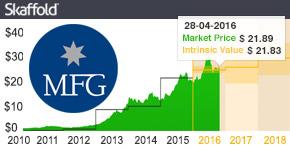Can Magellan Financial's exceptional run continue?
By Chris Batchelor
Key statistics: ASX:MFG
03.05.16 closing share price: 21.920
52 week high: 28.220
Most recent dividend: 51.300c
Annual dividend yield: 4.14%
Franking: 100%
Magellan Financial Group is a fund manager focused on investing in international shares. When you buy shares in Magellan Financial Group you are investing in the business that manages the funds, not the funds themselves.
The way Magellan earns revenue is through the fees they charge to the unit holders in their funds. Fund managers like Magellan usually charge a management fee and a performance fee.
The management fee is calculated as a percentage of the funds under management, and the performance fee is received if they are able to generate returns that exceed a benchmark.
Therefore revenue is driven by two things. First the ability to grow funds under management by generating good returns, and second, the amount of new investment funds the funds can attract (which is often related to point one).
Magellan has had an exceptional run over the past four years.
Fund under management have grown from $4 billion in 2012 to $39 billion today. Over the same time the share price has grown from $0.68 to $21.89. Magellan's focus on global equities continues to work to its advantage as more people, and especially SMSF's, realise the benefits of diversifying their portfolios across global markets.
The amount of money in superannuation accounts now exceeds the total market capitalisation of the ASX so super funds must look to other opportunities.
The growth in funds has corresponded with growth in revenue and profits. Earnings per share were $1.08 in 2015 and are forecast to grow to $1.38 by 2018. Dividends are also growing strongly with a current forecast dividend yield of 4.2%.
The big unknown with an investment in a fund manager is how the markets will perform.
As revenue is tied closely to the amount of funds they manage, a sharp or prolonged downturn in global markets could impact negatively on their profits. A downturn can have a three pronged impact. The base fee is calculated on a lower amount.
Depending on the parameters of the performance fee it is unlikely to be payable and the negative sentiment is likely to lead to a reduction in net new investments, and may even lead to a net outflow of funds.
The estimated intrinsic value of Magellan has grown since 2010 and is forecast to continue for the next two years at least. Magellan's nearest listed rival is Platinum Asset Management.
Both firms have a market capitalisation of about $3.5 billion however Magellan's funds under management exceed Platinum's by about $14 billion, so on that comparison Magellan is relatively cheaper.
Magellan's share price hit a high point at the start of January of $28.22. It has since retracted 22% to $21.89 and is trading at about the same level as its estimate of intrinsic value.
Disclosure: The author's related parties have holdings in MFG.
Get stories like this in our newsletters.



